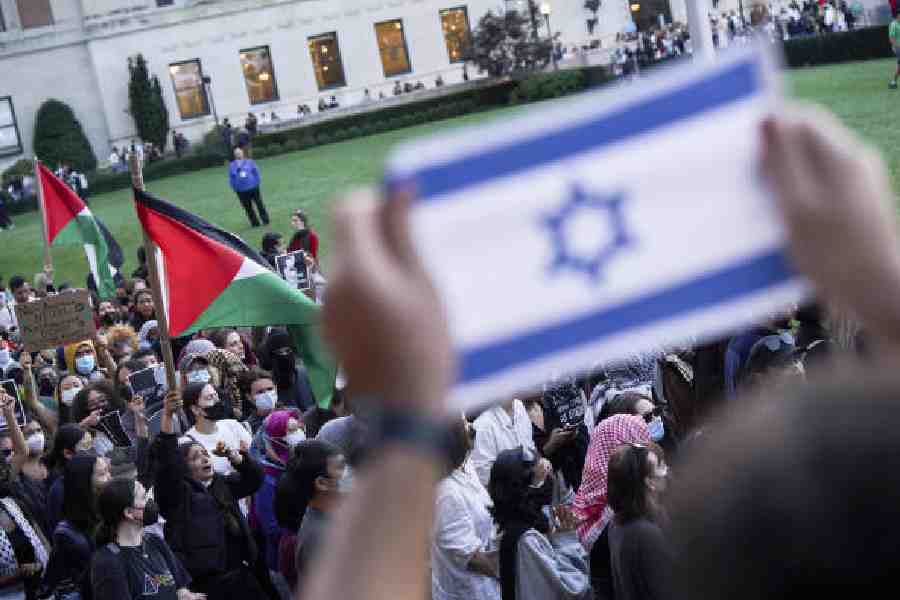US college campuses convulse in protest as Israel and Hamas stays busy in fighting


Tensions have been high on university campuses in the US since the war between Israel and Hamas began.
The police were called to a student Senate meeting at the University of California, Davis, US, after students supporting Israel and Palestine began shouting at one another. Stanford Law School moved classes online for a day because of students’ concerns about their safety. An Arab Muslim student at Stanford University was hurt in a hit-and-run crash that’s being investigated as a hate crime.
Some have compared the scale of campus protests to demonstrations against the Vietnam War in the 1960s, but there’s a key difference. This time, there are deeper divisions among students, as the conflict has widened a yawning gulf bet- ween those supporting Israelis and Palestinians.
Many students disagree about how to even talk about the violence, and feelings are heightened by grief as deaths continue to mount in West Asia. Hamas’ surprise attack on Israel on October 7 killed 1,400 people, and the Israeli government has since unleashed a devastating barrage of airstrikes against Hamas in the Gaza Strip, where health officials say more than 10,000 people are now dead.
At the University of Cali- fornia Berkeley in the US, a campus famous for its political activism, students on both sides have reported that they’ve been threatened and doxxed. Many wear masks to protests for fear of being identified and harassed on social media.
The debate has been polarising. A Berkeley law professor wrote an opinion essay in The Wall Street Journal calling for firms not to hire his “antisemitic law students”. A group of 300 UC faculty members, including many at UC Berkeley, wrote a letter condemning the university system’s use of the word “terrorism” to describe Hamas’ attacks on Israel.
After a conflict on UC Berkeley’s Sproul Plaza between Jewish students and those opposed to Israel’s actions, in which a campus rabbi took a few blows, Ron Hassner, a professor of Israel studies, had an idea. He emailed Hatem Bazian, a lecturer in Middle Eastern languages and cultures and Asian American and Asian diaspora studies, to ask if he would want to co-write a statement calling for students to treat one another with dignity and respect.
The two men teach in the same building and are cordial to each other, but they disagree vehemently on Israel and the Palestinian territories. They share no common ground — and that was exactly the point of coming together to collaborate. UC Berkeley’s chancellor, Carol Christ, emailed their statement to the student body. It reads, in part: “We will not tolerate our students harming one another. Disagreement and differing points of view are an essential part of campus life, and we expect that you treat one another with the same respect and dignity that we are modelling here.”
The statement is spare, in part because there is so little the men agree on, including the language to characterise the violence in West Asia. When I contacted them about a joint phone interview, they each said they preferred to speak separately.
“The wounds are open, and we are grieving,” Hassner said. “The significance of the letter is not that we are friendly colleagues who joined forces for peace but rather that we are not. Writing that letter together was very hard for both of us.”
Bazian said that their statement wasn’t meant to change people’s minds about the conflict, but to dissuade students from violence. “With the intensity of what is taking place in Gaza, I think the temperature of the campus is at a high critical level,” he said. “We want to make sure that everyone has the space to express themselves without actually crossing any boundaries they would regret.”
Hassner said he was clinging to the statement as a sliver of optimism in a dark time. He had been moved to tears when Bazian agreed to write it with him. He told me, “It seemed like a moment of hope for academia — that there’s something that can be saved if two professors who disagree about everything can agree that academia is sacred. Then at least we’re standing on a solid foundation. And that gives me a lot of hope.”
NYTNS